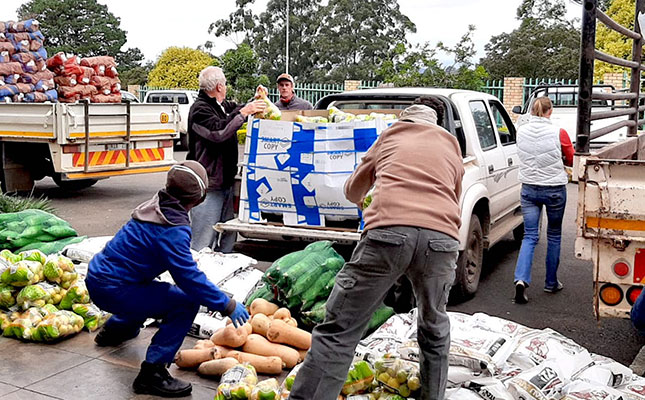
Photo: Kwanalu
Numerous KwaZulu-Natal (KZN) farmers have been directly or indirectly involved in donating food and other resources to increasingly poverty-stricken residents in their local communities.
This is despite many of these farmers also struggling financially, due to the impact of the nationwide lockdown to contain the coronavirus disease (COVID-19), and other challenges.
Leaders of both the KZN Agricultural Union (Kwanalu) and the KZN chapter of the African Farmers’ Association of South Africa (AFASA KZN) told Farmer’s Weekly that their members across the province had been helping in any way they can within their personal means.
Kwanalu’s CEO, Sandy La Marque, said the union’s members had donated money, as well as several tons of fresh and dry produce, thousands of vegetable seedlings, and thousands of litres of milk.
She added that these farmers and their local farmers’ associations had either worked independently, or with other public or private entities to make up food parcels, identify needy households, and deliver the food parcels to the targeted beneficiaries. Thousands of people had reportedly already been supported by these efforts that were still ongoing at the time of publishing.
“The selflessness, rapid organisation and collaboration of these farmers is truly outstanding, and [is] testament to the generosity and strength of the relationships the farmers have with their local authorities and communities. We are incredibly proud of the work these farmers are doing for those in need, and look forward to seeing more projects like this for our nation’s benefit as a whole,” La Marque said.
AFASA KZN’s chairperson, AJ Mthembu, said that while most of his association’s members had not initially understood just how economically devastating the national lockdown would be on the country and its people, this perception had quickly changed.
“Many of our members are emerging smaller-scale farmers who are also struggling financially [due to] things like the drought, the foot-and-mouth disease outbreak, and now the impact of the lockdown. But they have realised that they are still much better off than many of their fellow South Africans, and are heeding AFASA’s call to help these less fortunate people in any way possible,” he said.
One such AFASA KZN initiative was asking about 50 of the association’s members to donate one head of cattle each.
These animals were then slaughtered, the meat and offal divided up into approximately 2 500 bags weighing 5kg each, and the bags distributed among needy households. Twenty-two cattle had already been donated to the initiative.
Mthembu said the association had also recently hosted a braai for homeless people in Pietermaritzburg.
“We are arranging for our members who are growing other commodities to also start donating a portion of their production towards these charitable initiatives. I’m very excited about it. It brings joy to be able to extend a helping hand to people who need it. Our efforts should not just be a once-off, but should continue into the future.”











